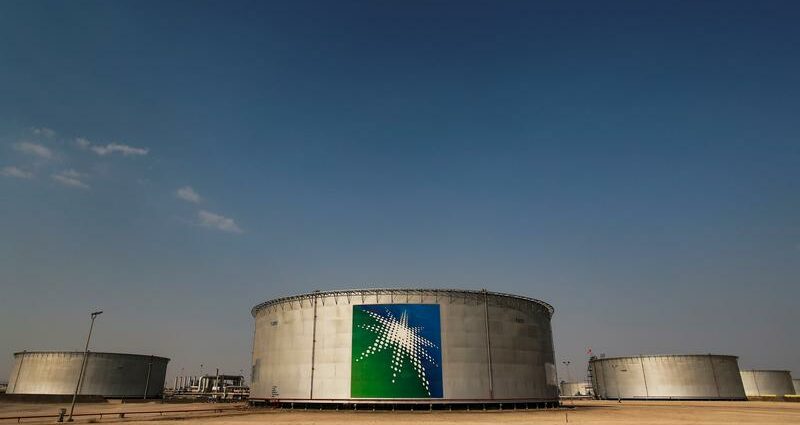(Reuters) – Oil prices surged on Monday, jolted by a surprise announcement by OPEC+ to cut production further in what top producer Saudi Arabia called a precautionary measure to support market stability.
Brent crude traded at $84.26 a barrel by 0347 GMT, up $4.37, or 5.5% after touching the highest in a month at $86.44 earlier in the session.
U.S. West Texas Intermediate crude was at $79.90 a barrel, up $4.23, or 5.6% after earlier hitting the highest level since late January.
The Organization of the Petroleum Exporting Countries and their allies including Russia shook markets by announcing production cuts of about 1.16 million barrels per day on Sunday.
The group known as OPEC+ had been expected to maintain its earlier decision to cut output by 2 million bpd until December at its monthly meeting on Monday.
The pledges bring the total volume of cuts by OPEC+ to 3.66 million bpd according to Reuters calculations, equal to 3.7% of global demand.
As a result, Goldman Sachs lowered its end-2023 production forecast for OPEC+ by 1.1 million bpd and raised its Brent price forecasts to $95 and $100 a barrel for 2023 and 2024, respectively, its analysts said in a note.
Goldman estimated the output reduction could provide a 7% boost to oil prices, contributing to higher Saudi and OPEC+ oil revenues.
The Biden administration said it saw the move announced by the producers as unwise.
Some analysts questioned the rationale for the extra production cut by OPEC+.
“It’s hard to buy the ‘pre-emptive’ and ‘precautionary’ reasoning – especially now, when the banking crisis had tailed off and Brent had crawled back up towards $80 from its 15-month lows earlier in March,” Vandana Hari, founder of oil market analysis provider Vanda Insights, said.
Last month, Brent fell towards $70 a barrel, the lowest in 15 months, on concern that a global banking crisis and rising interest rates would hit demand despite lower OPEC oil output in March due to oilfield maintenance in Angola and a halt in some of Iraq’s exports.
“Today’s move, like the October cut, can be read as another clear signal that Saudi Arabia and its OPEC partners will seek to short circuit further macro sell-offs and that Jay (Jerome) Powell is not the only central banker that matters,” RBC Capital analyst Helima Croft said.
“The bottom line is Washington and Riyadh simply have different price targets for their key policy initiatives.”
Analysts at JP Morgan said the move came later than they had expected and the slow response to weaker prices would have a limited impact on overall balances and could delay the price impact.
“Since November our global oil supply-demand balance suggested a strong policy action was needed to keep global oil surpluses in check,” they said.
Meanwhile, U.S. crude production rose in January to 12.46 million barrels per day (bpd), the highest since March 2020, Energy Information Administration (EIA) data showed on Friday.
Source: Read Full Article
-
Biden says he would use force as 'last resort' to keep Iran from nuclear weapons
-
Earnings Previews: Genius Sports, Home Depot, Sea Limited, Walmart
-
Earnings Previews: Applied Materials, Deere, Foot Locker, Ross Stores
-
Polls open in Tunisian vote boycotted by opposition
-
Monday’s Top Analyst Upgrades and Downgrades: Dollar General, Delta Air Lines, JD.com, Prudential, Trip.com, United Airlines, Verizon and More

